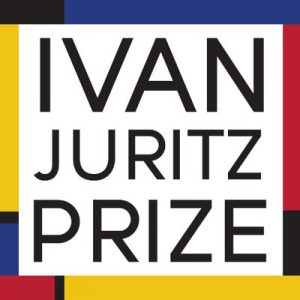By Imogen Free
Nick Makoha’s ‘A Low-Pressure System’ moves through the past towards mythology; it is a personal journal that resists any fixity, but instead is a series, as Ivan Juritz Prize judge, Will Eaves notes, ‘perpetually in flight’. This retelling of the events related to the Entebbe hijacking in 1976 is paralleled against a series of flights from Nick’s own experience, and despite writing through dramatic historical events, his moving voice can be felt strongly throughout. This became particularly evident when listening to him read from Codex 2 during our prizegiving event at the end of June. Codex 2 is a poem about his father’s personal and political life; reading from it, we saw him half-smile as he came to the last line: ‘I had a small nonspeaking part’.
Erchao Gu’s ‘A virtual tour of a virtuous place’ transforms Arthur Rimbaud’s poem ‘Enfance’, originally written during the poet’s stay in a cellar in London, by setting it to music that beautifully revivifies its sense of subterranean romanticism. But the piece also speaks to the experience of collective isolation shared by many sunless flat-dwellers during lockdown. It does so, Gu notes, in order to investigate the idea of London’s ‘rented afterlife’.
The rhythms of Edward Gwyn Jones’ ‘Genesis’ pulse through the body of its audience; its atmosphere, and its illumination, is electric. In Edward’s words, the piece was inspired by ‘an absurd story by Peter Gabriel’, and ‘explores our relationship to artificial light’. This dynamic piece employs intense audio-visual ‘switches’, pauses, and moments of disjuncture that make the experience of watching the film both consuming, and curiously open and expansive.
These are the winners of the Ivan Juritz Prize 2021. The prize is a postgraduate competition that celebrates creative work that responds to the modernist impulse for experimentation. Each of the works selected this year provides a fresh approach to this experimentalism – in terms of form, perspective and material – and though each possesses an entirely unique tone, they all resonate with the modernist call to ‘make it new’.

The prize was founded in 2013 for this very purpose, and over the past year, I’ve been assisting Professor Lara Feigel and Dr Ben Schofield in its running, as administrator for the Centre for Modern Literature and Culture. It has been a brilliant experience working for a project that celebrates emerging artists working across diverse forms, who are striving to refine their practice while responding to contemporary issues. The prize-giving event that took place on the 23rd of June really granted me a sense of the incredible creative community the prize fosters. Hearing this year’s judges, writers Will Eaves and Richard Scott, composer Arlene Sierra, and artist and academic, Josephine Pryde, reflect on the fantastic shortlisted works with such care and in such detail was both heartening and stimulating.
I am also delighted that thanks to support from Cove Park, an international artists’ residency based in Scotland, and from the AHRI, all three winners will be able to take up an artist’s residency this Autumn. We are hopeful that this space and time at Cove Park will allow the artist’s to enjoy further experimentation, and to build fruitful networks for future collaboration.
I would strongly recommend any emerging postgraduate artists working in any form (text, sound, visual arts, etc.) to apply to next year’s prize, which will re-open for submissions in the Autumn. In the meantime, you can read more about our fantastic shortlisted and winning works here.
Imogen Free is a LAHP funded PhD candidate here at King’s, researching modernist women’s writing, sound, and the politics of aurality and vocality (1930-1956). She has been the administrator for the Centre for Modern Literature and Culture since the beginning of 2021. She is the author of the article, “‘Outside the Machine’: Stasis and Conflict in the work of Jean Rhys”, published by Women: A Cultural Review in 2020, and is currently working on chapters for the upcoming Edinburgh Companion to Literature & Sound Studies and a collection of essays on Telepoetics. Outside of her research, she has published poetry in SPAM Zine and Eyot, among others, and is poetry editor for the Still Point Journal.
Blog posts on King’s English represent the views of the individual authors and neither those of the English Department, nor of King’s College London.
You may also like to read:

